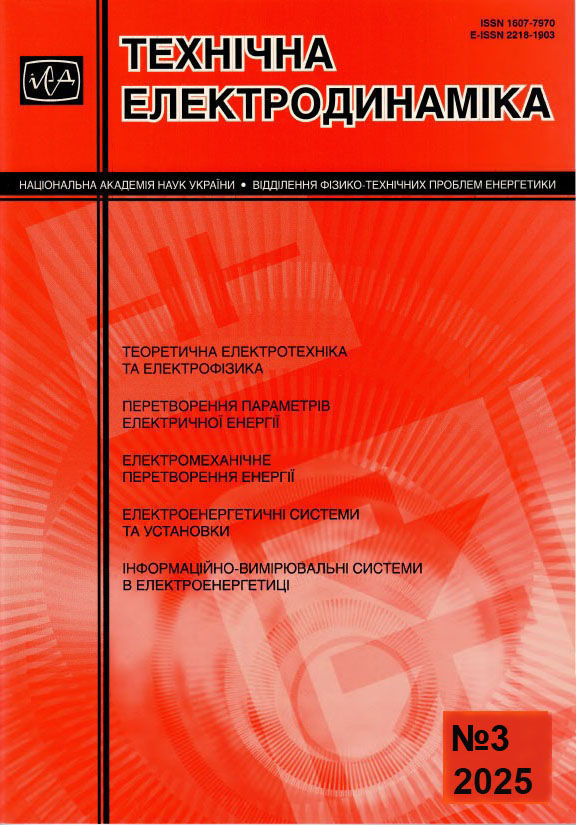Abstract
Due to the instability of renewable energy sources, maintaining the stable operation of microgrids becomes an urgent and difficult task. energy storage systems can provide uninterrupted power for such Microgrids, but their integration is accompanied by challenges related to determining the optimal storage parameters. This study presents a method that allows optimizing the capacity of the energy storage system, taking into account various controller algorithms of the operation of the prosumer’s microgrid. Purpose. Development of a method for determining the optimal capacity of an energy storage system to maximize profit from interaction prosumer’s microgrid with the power grid. Two radically different controller algorithms of microgrid operation are considered: the first is focused on the maximum use of solar generation, and the second is on the balanced use of all elements of the prosumer’s microgrid system, including storage and energy consumption. A microgrid was studied using the example of a prosumer, which includes a solar photovoltaic system, a load profile, an energy storage system and connection to the power grid at a three-zone time-to-use tariff. In order to evaluate the effectiveness of the selected strategies, an analysis of indicators for winter and summer days was carried out, which made it possible to reveal the effect of seasonality on the operation of the microgrid. The proposed method allows to determine the capacity of the energy storage system when designing individual solar photovoltaic system. References 15, table 2, figures 10.
References
Aghmadi A., Mohammed O.A. Energy Storage Systems: Technologies and High-Power Applications. Batteries. 2024. Vol. 10. No 4. P. 141. DOI: https://doi.org/10.3390/batteries10040141.
Ali Z.M., Calasan M., Aleem S.H.E.A., Jurado F., Gandoman F.H. Applications of Energy Storage Systems in Enhancing Energy Management and Access in Microgrids: A Review. Energies. 2023. Vol. 16. No 16. P. 5930. DOI: https://doi.org/10.3390/en16165930.
APOLLO cloud statistics. SoDa. URL: https://www.soda-pro.com (accessed at 12.10.2024).
Blinov I.V., Parus Ye.V., Shymaniuk P.V., VorushyloA.O. Optimization model of microgrid functioning with solar power plant and energy storage system. Tekhnichna elektrodynamika. 2024. No 5. Pp. 69–78. DOI: https://doi.org/10.15407/techned2024.05.069. (Ukr)
Elalfy D. A., Gouda E., Kotb M. F. et al. Comprehensive review of energy storage systems technologies, objectives, challenges, and future trends. Energy Strategy Reviews. 2024. Vol. 54. P. 101482. DOI: https://doi.org/10.1016/j.esr.2024.101482 .
Kulapin O., Makhotilo K. Modeling of Prosumer Load Profiles based on behavioral approach. Energetyka: ekonomika, tekhnologii, ekologiia. 2024. No 1. Pp. 98–105. DOI: https://doi.org/10.20535/1813-5420.1.2024.297584. (Ukr)
Sharma P., Saini K.K., Mathur H.D., Mishra P. Improved Energy Management Strategy for Prosumer Buildings with Renewable Energy Sources and Battery Energy Storage Systems. Journal of Modern Power Systems and Clean Energy. Vol. 12. Issue 2. Pp. 381–392. DOI: https://doi.org/10.35833/MPCE.2023.000761.
Fedorchuk S., Ivakhnov A., Bulhakov O., Danylchenko D. Optimization of Storage Systems According to the Criterion of Minimizing the Cost of Electricity for Balancing Renewable Energy Sources. IEEE KhPI Week on Advanced Technology (KhPIWeek), Kharkiv, Ukraine, 05-10 October 2020. Pp. 519–525. DOI: https://doi.org/10.1109/KhPIWeek51551.2020.9250155.
Bouakkaz A., Mena A.J.G., Haddad S., Ferrari M.L. Efficient energy scheduling considering cost reduction and energy saving in hybrid energy system with energy storage. Journal of Energy Storage. 2021. Vol. 33. P. 101887. DOI: https://doi.org/10.1016/j.est.2020.101887.
Gopee Y., Gaetani-Liseo M., Blavette A., Camillers G., Roboam X., Alonso C. Energy Management System for a Low Voltage Direct Current Microgrid: Modeling and experimental validation. 48th Annual Conference of the IEEE Industrial Electronics Society( IECON 2022), Brussels, Belgium, 17-20 October 2022. Pp. 1–6. DOI: https://doi.org/10.1109/IECON49645.2022.9968485.
Kulapin O., Makhotilo K. Selection of Optimal Battery Capacity of the Household Prosumer. Visnyk Vinnytskoho Politekhnichnoho Instytutu. 2024. No 4. Pp. 30–36. DOI: https://doi.org/10.31649/1997-9266-2024-175-4-30-36. (Ukr)
Hashemi A., Derakshan G., Pahlavani M., Abdi B. Optimal Scheduling of Residential Electricity Demand Based on the Power Management of Hybrid Energy Resources. Environmental and Climate Technologies. 2020. Vol. 24. Issue 1. Pp. 580–603. DOI: https://doi.org/10.2478/rtuect-2020-0036.
Sharma P., Bhattacharjee D., Mathur H.D., Mishra P., Siguerdidjane H. Novel optimal energy management with demand response for a real-time community microgrid. IEEE International Conference on Environment and Electrical Engineering and IEEE Industrial and Commercial Power Systems Europe (EEEIC/I&CPS Europe), Madrid, Spain, 06-09 June 2023. Pp. 1–6. DOI: https://doi.org/10.1109/EEEIC/ICPSEurope57605.2023.10194855.
Zhao C., He J., Cheng P. та ін. Consensus-Based Energy Management in Smart Grid With Transmission Losses and Directed Communication. IEEE Transactions on Smart Grid. 2017. Vol. 8. Issue 5. Pp. 2049–2061. DOI: https://doi.org/10.1109/TSG.2015.2513772.
Fouladi E., Baghaee H., Bagheri M., Lu M., Charehpetain G.B. BESS Sizing in an Isolated Microgrid Including PHEVs and RERs. 2020 IEEE International Conference on Environment and Electrical Engineering and 2020 IEEE Industrial and Commercial Power Systems Europe (EEEIC/I&CPS Europe), Madrid, Spain, 09-12 June 2020. DOI: https://doi.org/10.1109/EEEIC/ICPSEurope49358.2020.9160640.

This work is licensed under a Creative Commons Attribution-NonCommercial-NoDerivatives 4.0 International License.
Copyright (c) 2025 Tekhnichna Elektrodynamika


